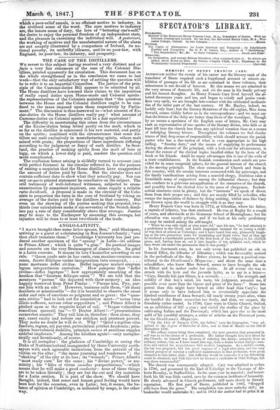THE CASE OF THE DISTILLERS.
WE revert to this subject having received a very distinct and ex facie a very fair statement of the case of the Colonial Dis- tillers, printed apparently for circulation. This document has on the whole strengthened us in the conclusion we came to last week—that the only satisfactory way of settling the question will be to refer it to an impartial Committee. The Justice of the prin- ciple of the Customs-duties Bill appears to be admitted by all. The Home distillers have lowered their claims to the imposition of really equal duties upon Home-made and Colonial spirits : the representatives of the Colonists maintain that "the question between the Home and the Colonial distillers ought to be con- fined to the taxes imposed upon them respectively by Parlia- ment." The discussion is thus narrowed to—what amount of Ex- cise-duties do the Home distillers really pay ? what amount of Customs-duties on Colonial spirits will be a fair equivalent ?
The difficulty in ascertaining this arises from the circumstance of the Excise-duties being levied partly on the malt, which in i so far as the distiller is concerned is his raw material, and partly on the spirits ; combined with the circumstance that some dis- tillers use malt exclusively in manufacturing spirits, others malt mixed with grain; the proportions of these ingredients differing j
according to the judgment or fancy of each distiller. In Scot- land, the practice of making spirits from the malt of here or bigg, on which a lower duty is paid, renders the question still more complicated. The confusion hence arising is skilfully turned to account (and with perfect fairness) in the circular referred to, for the purpose of raising a suspicion that the Home distillers have exaggerated the amount of duties paid by them. But the circular does not contain sufficient data to show what they actually pay. Nor can any ex-parte printed statement be conclusive on the subject. The oral testimony of well-informed witnesses, subjected to cross- examination by competent inquirers, can done supply a reliable ratio decidends. A proposal is made in the circular of the Colo- nists to proportion the rates in the case of Scotland by taking an average of the duties paid by the distillers in that country. But even on the showing of the parties making this proposal, two- thirds (our calculations make it six-sevenths) of the Scotch distil- lers pay a rate of duty considerably above that average. Justice may be done to the Exchequer by assuming this average, but injustice will be done to at least two-thirds of the trade.


























 Previous page
Previous page